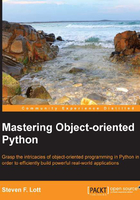
Chapter 1. The __init__() Method
The __init__() method is profound for two reasons. Initialization is the first big step in an object's life; every object must be initialized properly to work properly. The second reason is that the argument values for __init__() can take on many forms.
Because there are so many ways to provide argument values to __init__(), there is a vast array of use cases for object creation. We take a look at several of them. We want to maximize clarity, so we need to define an initialization that properly characterizes the problem domain.
Before we can get to the __init__() method, however, we need to take a look at the implicit class hierarchy in Python, glancing, briefly, at the class named object. This will set the stage for comparing default behavior with the different kinds of behavior we want from our own classes.
In this chapter, we take a look at different forms of initialization for simple objects (for example, playing cards). After this, we can take a look at more complex objects, such as hands that involve collections and players that involve strategies and states.